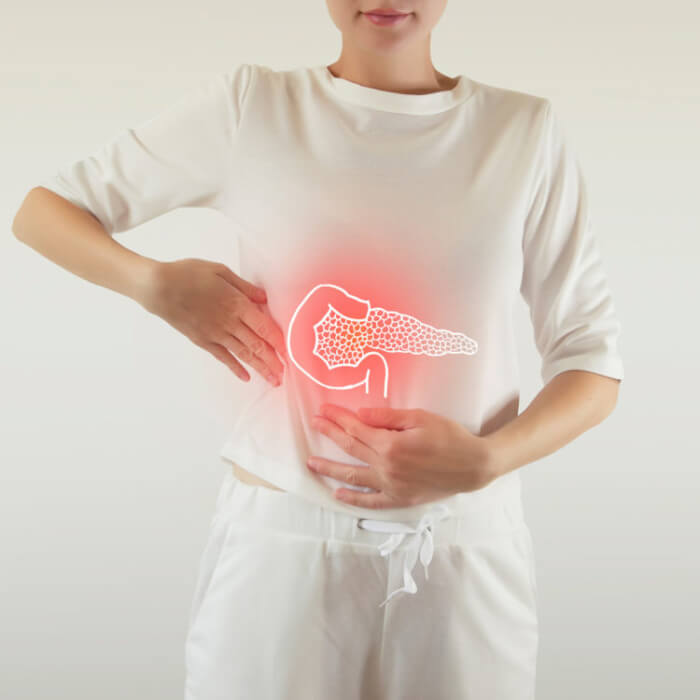Gastroenterology is a speciality of internal medicine that deals with diseases of the gastrointestinal tract. It includes diseases of the oesophagus, stomach, small and large intestine, liver, biliary tract and pancreas. The most common gastroenterological diseases are:


As part of the gastroenterological examination, imaging tests may be necessary: abdominal ultrasound, CT scan, MRI if necessary. For the diagnosis of digestive diseases, a colonoscopy (colonoscopy of the colon) or gastroscopy (gastroscopy of the stomach) is performed. Most of these tests are performed under general anaesthesia.
Exhalation tests are also used to diagnose lactose sensitivity, Helicobacter pylori infection causing gastric and duodenal ulcers, contaminated small bowel syndrome (SIBO) caused by bacteria in the large intestine, and fructose malabsorption. In food intolerance testing, food sensitivities as a consequence of an immune response are investigated. The screening is performed on blood.
Colon cancer is characterised by the fact that it does not cause any symptoms for a long time. Colonoscopy makes it easy to detect any tumours that may have already developed and, more importantly, to identify the tiny growths on the mucous membrane (polyps) that can be considered as a precursor to colon cancer.
Colonoscopy is an endoscopic method of colonoscopic examination of the colon. The colonoscopy procedure is as follows:
Colonoscopy can be performed with or without anaesthesia. You should not eat the night before a colonoscopy, and if you are hungry, you should take some glucose or honey. For more information, read our blog post on colonoscopy.
The hydrogen exhalation test can painlessly detect lactose intolerance, contaminated small bowel syndrome (SIBO) and fructose intolerance.
When the test fluid ingested during the test is broken down, hydrogen gas is produced, absorbed into the bloodstream and then exhaled through the lungs.
The procedure for a special gastroenterology test:
After adequate preparation, the patient ingests a test liquid containing lactose, fructose or lactulose. During the test, every 20 to 30 minutes for 180 minutes, the exhaled air is blown into a tube connected to the measuring device, which measures the rise in hydrogen levels.
Preparations for the test:
Helicobacter pylori is responsible for a large proportion of inflammation and ulcers in the digestive tract and increases the risk of developing tumours in the digestive tract. It colonises the superficial mucus layers of the gastric mucosa, is highly resistant and thrives in the gastric acidic environment. The presence of the bacterium can be detected by a rapid and painless exhalation test.
The tablets taken during the test contain the carbon isotope C14, a naturally occurring radioactive isotope found in the air and in the human body. The patient will only be exposed to a level of radiation equivalent to the radiation received from naturally occurring background radiation in the environment over a 24-hour period.
Nevertheless, the test is not recommended:
The feeding tube can prevent and treat malnutrition associated with cancer and anti-tumour treatments, and can help to ensure that the right amount, composition and quality of food is provided to avoid deficiencies. Tube feeding may be necessary if the patient is unable to eat enough nutrients by conventional means for whatever reason, or if there is a barrier to the consumption of oral nutrients.
Accepting tube feeding can be both physically and emotionally challenging, so it is important to understand that if there is no other option, artificial feeding
The use of a feeding tube requires a dietetic and gastroenterological consultation. In some specific cases, where home tube feeding needs to be introduced, our specialists can also actively assist in the patient’s training and care. Another advantage is that the patient can recover in a family environment. Its success depends on the cooperation between the home care nurse and the hospital/specialist team and the patient’s education.
There may also be risks associated with tube feeding, and our specialist will provide full information on this during the gastroenterology examination.

We offer private gastroenterology consultations, including various types of food intolerance tests and gastroscopy. Book an appointment with our excellent gastroenterologists online or call us at +36-1-323-7000 to be seen at our well-equipped clinic in Buda without a long wait.